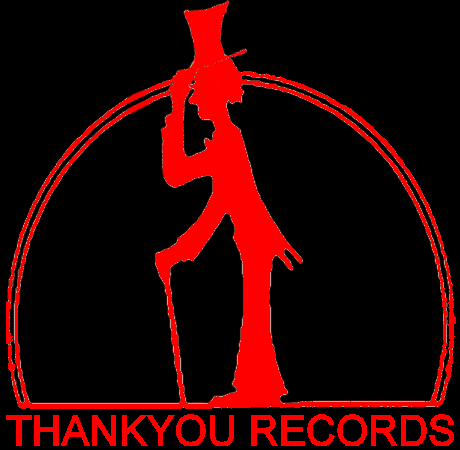It Is Not I Who Seek The Young Fool
From: The Succulence Of Abstraction (MV015)

THANKYOURECORDS
CATALOG / DISCOGRAPHY
M I C H A E L V L A T K O V I C H
Composer / Trombonist
...Vlatkovich is the finest trombonist improvising today. Jazz Review
DOUBLE YELLOW
PURCHASE
PHYSICAL CD
MV011 (CD) (2000)
$20.00
INCLUDING SHIPPING
The people in the front are going to have a good time.
The people in the back are going to have a good time too.
PERSONNEL
Rob Blakeslee – trumpet / flugelhorn
Michael Vlatkovich – trombone / claps
William Roper – tuba / conch / voice, wine glasses, gong
Brad Dutz - a lot of percussion
REVIEWS
For all the little instruments (some of which whose names are indecipherable due to unusual type), the main focus of Double Yellow is with the horns. Many will recognize the label, ThankYou Records, as a vehicle for Michael Vlatkovich, a freestyle trombonist who never fits any molds. Here, he plays with a quartet that features individual and collective improvisations around usually laconic tempos and sparse densities. With all the potential diversity due to the varied instruments, often only a couple of players go at it at once, and the trombone. trumpet, and tuba share honors with what sounds like, at various times, vibes, percussive elements, and flute-like tones.
Trumpeter Rob Blakeslee is given room to explore in his characteristically lyrical way. Actually, much of the music is melodious, though not of any particular melody. Bill Roper lays down some lovely lines on tuba on "Aurora Borealis," backed by Brad Dutz on various little instruments. Michael Vlatkovich toots his bone throughout, with a clear, ringing sound, but he is also constrained by the arrangements. The trombonist shows a more restrained side here than usual, as the ambiance is not designed to display virtuosity. Instead, the individual contributions are very much subordinated to the sound of the collective. The pace rarely quickens, and yet there is fascinating interplay that requires close listening. Less compelling, perhaps, than other recordings by some of these performers, including Vlatkovich, it is still important and intriguing for the different perspectives it shows.
Steven Loewy, Cadence - November 2000
Double Yellow, Rob Blakeslee, tpt, flgl; Michael Vlatkovich, trb and claps; William Roper, tuba, conch, voice, wine glasses, gong; Brad Dutz, a lot of percussion.THANKYOU Records
What a formidable lineup. Each a solid leader in their own right, as an ensemble they improvise as a unit: What could have been a session to see who could outblow the other, instead becomes a delightful study in interplay. From the opening squeeks and slapped mouthpieces to the closing concertina with brass counterpoint, this is a collection of great improvs that will bear repeated listenings. Birdcalls, trumpeting tuba, harmon (plunger?) trombone, fluttering trumpet interrupted by splashes of percussion, trombone quoting Gershwin behind a groove of shakers·and that is just one track (Ice Flow)·
Though the music has a serious face, humor is always slinking about..., waiting to erupt in some grotesquely funny way. Double Yellow, a new CD featuring the band by the same name, presents a series of free improvisations by Portland based artists Rob Blakeslee on trumpet, flugelhorn & misc., Michael Vlatkovich on trombone and misc., along with Los Angeles based Brad Dutz on innumerable percussion & concertina, plus William Roper on tuba, percussion, voice, bovine horns and shells. From this somewhat traditional combination of instruments emerges an unusual music of arresting timbres, intelligence, wit and intensity.
"...[Double Yellow is]fascinating spur-of-the moment chatting going on simultaneously here between four real characters, yet none trying to out shout the other."
"...Moreover, you'll find its real beauty runs deep, far more than a collection of aural artifices. If you are not hidebound by the notion that music must be steeped in tradition, then Double Yellow deserves your ears."
Russell Arthur Roberts, L.A. Jazz Scene, November 2000
Double Yellow is a 1999 recording featuring Roper performing alongside some venerable West Coast modern jazz musicians. Here, percussion wunderkind Brad Dutz utilizes an arsenal consisting of gongs, cymbals, tablas, chimes and more as trumpeter Rob Blakeslee and trombonist Michael Vlatkovich mince accenting tonalities, with poignant interludes, modern jazz interplay and world beat grooves. Moreover, the band also partakes in sonorous extended note drones, subtly climactic passages, oscillating crosscurrents and indigenous rhythms. Basically, the musicians’ pursue some sort of transcendental aura in conjunction with their largely unclassifiable methodologies and cascading soundscapes. Double Yellow brims with contrasting notions intermingled into a rather quixotic presentation, although a sense of mystery tends to hover atop the proceedings as though the listener might be sequestered in a sacred ruin during the still of night. While it will not be suggested that the band is serving up a religious mantra, the music, whether vibrantly performed or quietly mystifying, rings of power and substance. Recommended.
Glen Astarita http://www.allaboutjazz.com/
ART
MV011 BACK
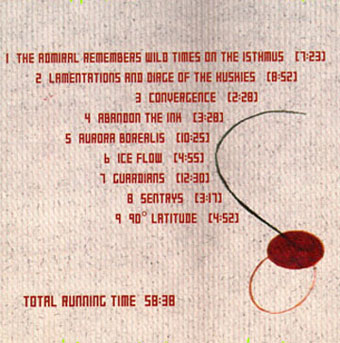
MV011 TRAY
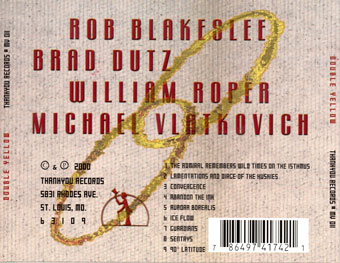
MV011 INSIDE LEFT
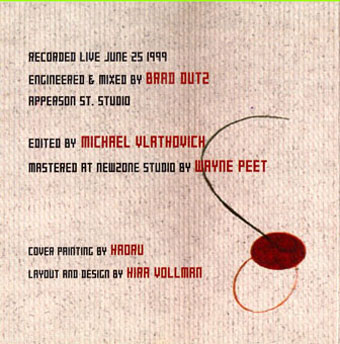
MV011 INSIDE RIGHT
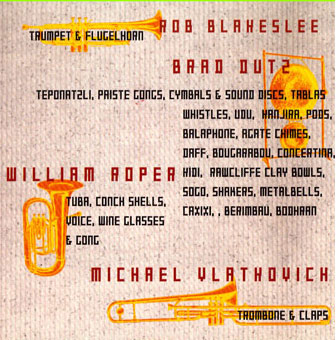
MV011 DISC
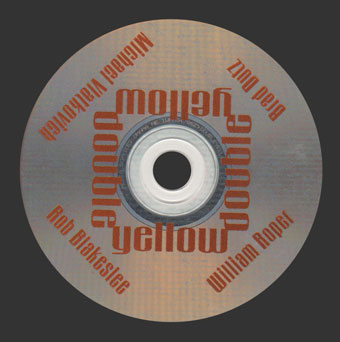
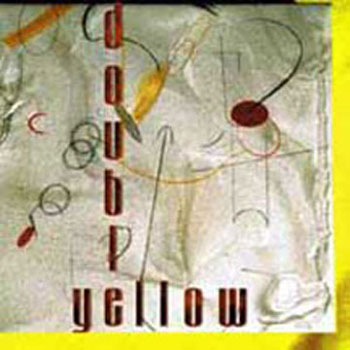
NO ZEE TWO ES
Michael Vlatkovich Trio
PURCHASE
PHYSICAL CD
MV010 (CD) (1998)
$20.00
INCLUDING SHIPPING
The people in the front are going to have a good time.
The people in the back are going to have a good time too.
PERSONNEL
Michael Vlatkovich – trombone / percussion
Anders Swanson - bass
Chris Garcia – percussion
REVIEWS
ODD BAR TRIO PLUS TROMBONE Lost Art Cafe (9 Winds;) MICHAEL VLATKOVICH TRIO No Zee Two Es (Thank You Records) Both trornbonists John Rapson and Michael Vlatkovich’s respective approaches have qualities that are more often associated with the early jazz trombone than with the smoother-flowing tones of the modern mainstream in which J.J. Johnson serves as a model, despite the progressive nature of the group music reviewed herein. Both Rapson and Vlatkovich were frequently visible on the Southland new music and jazz scene, having been closely associated with avant-garde composer and reedman Vinny Golia. Vlatkovich now resides in Portland, Oregon, and Rapson is presently in charge of Jazz Studies at the University of Iowa after having spent I 0 years (1980-90) as professor of music theory and composition at Westmont College in Santa Barbara, where he founded a jazz studies program, and acquiring a doctorate in ethnomusicology from Wesleyan University in 1993.
Not only is Rapson's style rooted in the past, but he in the company of the Iowa City-based Oddbar Trio- Brcnt Sandy (trumpet, pocket trumpet, flugelhorn), Steve Grismore (guitar), Jim Dreier (drums, percussion)--take a devious trip into it as well, on Lost Art Cafe, by way of the swing classic. "Stompin' at the Savoy"; a homage to Thelonious Monk, "Monk's Mood"; and a soporiferous "A Call of All Demons," by Sun Ra; plus a countrified tune "Ode to Idaho") and a strange mambo ("Beat Cajun Mambo"). There is also a tune remindful in some respects of the vampish funk of Herbie Hancock's 1973 Headhunters album. Among other (oddities, there is even a song having a churchy processional aspect ("July Hymn"). All creatively fascinating by an extraordinary ensemble of musicians. A must for those who have an ear for the unusual.
Where the music of Lost Art Cafe was obviously carefully worked out in advance, that of the Michael Vlatkovich Trio, No Zee Two Es - with locals, Anders Swanson (bass) and Chris Garcia (drums, percussion) was in the main conceived on the spot, relying on a modicum of harmony and defined rhythm while stressing the linearity of melody in a free-associative manner. Therein primarily lies its intrigue, not to ignore the appealingly rich trombone styling that, incidentally, is found in both albums.
Russell Arthur Roberts, LA Jazz Scene, February 2000
Michael Vlatkovich should be familiar to close readers of this magazine for his earlier well received albums as a leader and for his work with, Vinny Golia. Vlatkovich's style puts him squarely in the post-bop tradition, but he places it in a free framework. Okay, so he's not J.J. Johnson Of George Lewis. But, why should he be? He is Michael Vlatkovich, very much an individualist who has carved a concept uniquely His. Somehow, even with his largely ordinary technique, there is something eerily appealing about the way Michael Vlatkovich plays, the way his personality permeates everything he does. To paraphrase the cliché, Vlatkovich marches to the beat of a different trombonist. His roots and influences are unclear, even though there is nothing revolutionary in his style. The trombonist stresses angular lines punctuated by fat, globular punches.
At first glance, you might miss it, but there is no question that he passionately molds an impressive result through perseverance and grit. The trombonist favors a punctuated rnuted sound that relies as much on highly focused effort as anything else. You cannot help but be sucked into his den, whether on the highly attractive and circus-like "Merle and Neil" or through some of his other charming melodies. The music, all composed by Vlatkovich, has a chamber feel yet it falls firmly in the Jazz camp. Ultimately, it is Vlatkovich's extraordinary concept his special "feel" that holds sway. While he favors slow tempos, he is equally comfortable up-tempo.
The recording is a lesson in how a good, but not extraordinary musician, through targeted and progressive vision, can achieve very special results. Vlatkovich's attractive sound in the mid-to-Iower range of the horn effectively dances over the powerful percussion and bass, which are particularly impressive in tandem when the trombone drops out. Swanson's bass regales in syncopated rhythms, and his solos show a solid sophistication, alternating between arco and pizzicato.
On "Roza Barbaosa," he sounds like an acoustic bass guitar. Chris Garcia's drums complement the bass, and support Vlatkovich effectively. On "Roza” the long interlude of bass and drums is a pleasant addition, while on the preceding piece, Garcia's march-like snare lays a creative backdrop over which the trombone showers winding lines. There are exciting moments throughout this release and some highly creative moments, including the interactive lines of the individual members of the trio, whether improvised or preconceived.
Steven A. Loewy, Cadence, July 2000
Trombonist lead trios aren't exactly commonplace but then again Michael Vlatkovich isn't your average trombonist. He squeaks, soars, and sears and tears sonic pieces of paper much like a saxophonist. More than once my lazy ears have wondered if a saxophone was in fact what Vlatkovich was playing bur further studies have long revealed that the extended physical length and negotiation that goes along with the trombone is also part of his sound. He has added greatly to sessions lead by Rob Blakeslee and Vinny Golia and has begun to build a reputation as a fine leader and composer. Quite simply, and with all due respect to players like Jed Bishop, Joe Fiedler, Masahiko Kono, Steve Swell, and even my all time favorite Roswell Rudd, Vlatkovich is the finest trombonist improvising today.
No Zee Two Es finds Vlatkovich in the company of his regular associates drummer Chris Garcia and bassist Anders Swanson in sessions from January 8 and July 10 of 1995. The eight tracks and over 60 minutes of music varies between swing and stammer and yet do not sacrifice much in the way of instrumental complexity. Much of the disc consists of a breezy trombone eeking out the blues while a rhythm succeeds in finding a way to play beneath the surface. Swanson, in particular breaks out with some great spacey lyrical playing on cuts like "chobraty" and "merle and nell."
While this music isn't exactly "out there," it is far from the "mainstream." There isn't a "blow out" or antagonistic section on this disc and yet all of the cuts have a smidgen of unpredictability that makes them challenging. "always connection," for instance, opens with a bright solo by Vlatkovich and continues on a path that would likely lull more adventurous to sleep if it wasn't for the looseness of Garcia and Swanson. Vlatkovich gets credit for writing all of the pieces though it remains unclear how much composition was involved in producing the music. I can imagine how these sounds came about through loose scores but then again I could see similar sounds coming from fully improvised date.
In the end, it doesn't matter as this music shines in or outside of any context. Fans of Jemeel Moondoc and other neo-free-boppers, such as the previously mentioned Rob Blakeslee, are sure to enjoy No Zee Two Es as is just about anybody with an ear for great playing and improvisation.
Lee Prosser jazzreview.com (site not up)
ART
MV010 PRODUCTION
Composed and produced by: M. Vlatkovich
© and ℗ 1998 Julius ivory Music, ASCAP
Recorded at: Tomsonics, Jan 8, 1995 and July 10, 1995
Recording Engineer: Tom Manassian
Layout by: Jeff Kaiser and M. Vlatkovich, with Harlan Goldberg
Mastered by: David Crigger
MV010 TRACKS
1. chobarty
2. gender green provided
3. merle and nell
4. always connection
5. the perfect construction of decisiver moments
6. pedal sharp for the name
7. a] with only letters on paper as clues
b] no zee two es
8. rosa barbaroza
MV010 BACK
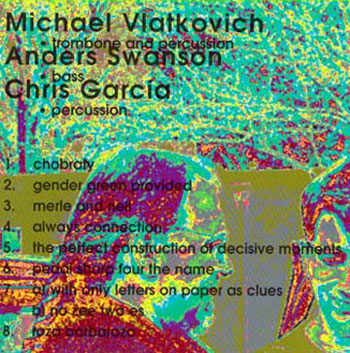
MV010 BOOK
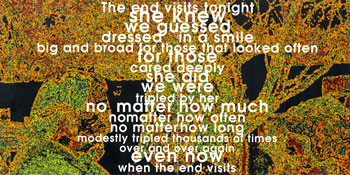
MV010 TRAY
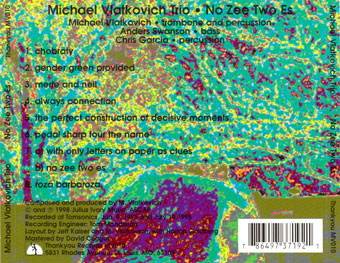
MV010 DISC
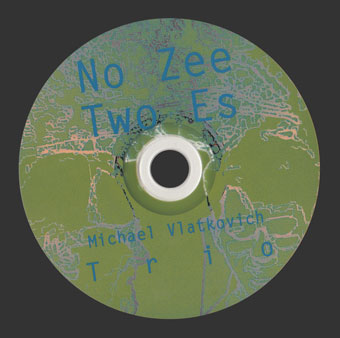
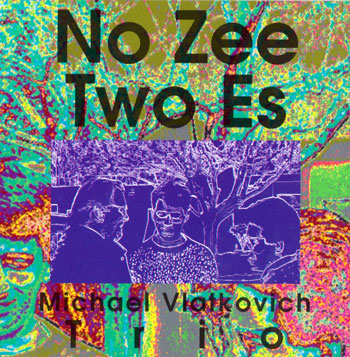
TORONTOLIVE
PURCHASE
PHYSICAL CD
MV008 (CD) (1998)
$20.00
INCLUDING SHIPPING
The people in the front are going to have a good time.
The people in the back are going to have a good time too.
PERSONNEL
Michael Vlatkovich – trombone / composition / percussion
Tom Walsh – trombone / percussion
Bill Plake - tenor saxophone
David Mott - baritone saxophone
Anders Swanson - bass
Chris Garcia - percussion
REVIEWS
No.8 in Kirk Silsbee's Favorite Local Jazz Albums of 1999.
LA New Times
Whoever said that the saxophone most closely resembles the human voice probably never heard Michael Vlatkovich’s trombone. Actually Vlatkovich sounds a lot like my uncle Rocco. He always sounded a bit tipsy, even when he wasn’t drinking. When Rocco enters a room, everyone knows it, Blap, Fwap everyone’s happy. When Vlatkovich speaks, er sings, it’s the same cavorting scale. For this live date saxophonist David Mott and trombonist Tom Walsh augmented his quartet. The music is part Rahsaan Roland Kirk whirling circus and part Charles Mingus workshop. Meaning the compositions are open-ended and the improvisations are soulful. Vlatkovich knows something about structured improvisation, being a frequent collaborator on Los Angeles based Vinny Golia’s projects including his famed Large Ensembles. Vlatkovich’s concepts start with the very aggressive Elvin Jones-muscular beat of drummer Chris Garcia. From this foundation, the piano-less band shifts pattern and time, not in sharp angles but sure-footed movements. They hop from blues to tangos and marches, all the time the trombones are vocalizing, articulating, and encouraging discourse. The bones bring out the voices of the saxophones. Bill Plake and Mott join in. A squeak here, repeated honks there, all add to the summit. Vlatkovich reminds me of a West Coast version of Tim Berne’s Bloodcount because the emphasis is placed upon group improvisation and non-traditional forms of music structure. All this in what I find to be very accessible music of the avant-garde. This disc is surely to be on my top ten releases of the year.
Mark Corroto, August 01, 2000
http://www.allaboutjazz.com/php/article.php?id=6064
Vlatkovich's session emphasizes the leader's compositions. It is a live session that integrates guest artists into the context of a working group. The guests - baritone saxophonist David Matt and trombonist Tom Walsh - fit into the session so well, even given the intricacy of some of the compositions, you'd think they were regulars. This blend of eclectic compositional structures and wide open blowing usually gets tagged as Mingus-influenced by reviewers, and certainly there's an element of that here. On the medley starting with "Ten on..." Vlatkovich even includes a creamy faux Ellington trombone ballad that certainly would be at home on a Mingus session. The ensemble, though, achieves its own distinctive sound. This is a scrappy, sprawling affair, at times a raucous circus - the band even launches into a bit of "Hernando's Hideaway" on "Watzter Tanzen." Vlatkovich is the life of the party with broad, boisterous solos that evoke the most serious clowning. Guest David Mott also registers some fine moments, especially on the "Ten on..." medley where he's pushed along by a unison trombone line. But no one lets down... this must have been an absolute gas to hear live. My only quibble is that three of the tracks fade out before their natural endings. The opener and closer both get this kind of musical Kevorkian treatment just as sax players are launching into solos. I realize time and, possibly, musical factors probably made this necessary, but it still bugs me. That, however, is a quibble, and far outbalanced by the high spirits and high quality of the rest of the date.
David Dupont, Cadence, April 2000
Since Michael Vlatkovich's music often displays a puckish sense of humor, it's not a huge surprise this live date featuring his regular quartet plus guests David Mott and Tom Walsh sports a bottom-heavy lineup of two trombones, tenor and baritone saxes, and bass/drums. Trumpet fans, steer clear--ain't nothin' for you here.
The sextet hit the ground running with the knotty theme of "Red Leather" before Anders Swanson's bass is off to the walking races and Chris Garcia drops bombs behind Vlatkovich's solo. The piece mysteriously fades out (tape problem, maybe?) after four minutes when it's nowhere near done. "A3BFGI3NOR2ST4" opens as abstractly as its title before a theme takes shape incrementally and the trombones create an almost polka feel behind the harmonized saxes' melody. It roams around, changes form and focus, but remains organic in conception, and that's not a bad capsule description of the music throughout Toronto Live.
If Vlatkovich has a model here, it most likely is from the Charles Mingus mode, where both the compositions and improvisations move through various sections. The key is the musicians listening and reacting to each other -- there's relatively little soloist-plus-rhythm section playing here without someone (or everyone) interjecting and developing some kind of contrapuntal supporting theme.
So "Why Don't You See Me?" starts blowsy noir blues that quickly breaks down into pointillist squiggles before setting off on Bill Plake's tenor solo. The "Ten On No Net" medley starts with a bright theme quickly left behind -- this crew doesn't take much time on any of the opening melodies -- to embark on a meandering voyage that encompasses a tempo downshift to launch Swanson into a strong solo and a mellifluous ballad ensemble topped by Vlatkovich's beautifully rounded tone. That's maybe half of what happens in the first half of the medley, which should give an idea about how much goes on within each piece here.
Garcia's punctuations support the sharp, winding, opening melody to "Walzer Tanken," and there's a funky groove working for a while behind a muted Vlatkovich solo on "27529," complete with a few semi-duck quacks. Swanson takes a brief solo, then shifts to arco and drops into a supporting role when the horns enter with pointillist dots.
Mott and Walsh are fully integrated into the music and everyone is in fine form -- Plake's sharp, staccato, tenor runs provide an excellent contrast to Vlatkovich, who's more into post-bop broad melodic blats than bop runs. There's not much more to say except that Toronto Live is full of adventurous, probing music that will keep listeners on their toes as much as Vlatkovich and company undoubtedly were when they created it.
Don Snowden, All Music Guide
Expressive trombonist. A distinctive compositional approach which strikes a good balance between polyphonic improvising and structure.
KIRK SILSBE - LA READER
Vlatkovich is an arresting writer who works with many different forms - numerical compositions, tango, waltzes, big band swingers, and more. He also assembles musicians accomplished enough to interpret his pieces with verve and imagination.
NEW TIMES
ART
This CD documents a music Gallery concert of the Michael Vlatkovich Quartet, performed April 29, 1992, in Toronto as part a national tour. We were very pleased to include special guests David Mott, baritone saxophone and Tom Walsh, Trombone for this particular concert.
MV008 BACK
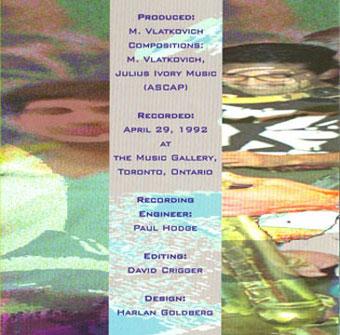
MV008 TRAY
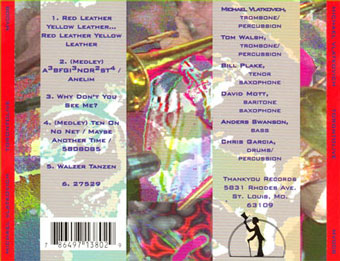
MV008 DISC
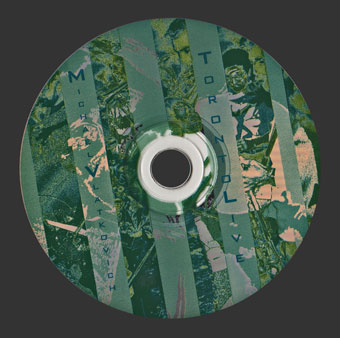
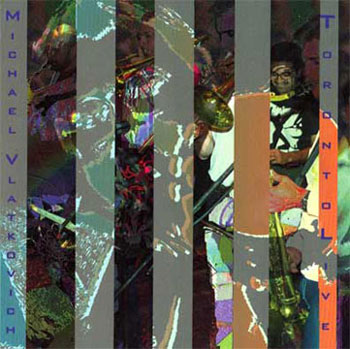
WHY DON'T YOU SEE ME?
PURCHASE
PHYSICAL CASSETTE
MV007 (Cassette) (1992)
$20.00
INCLUDING SHIPPING
The people in the front are going to have a good time.
The people in the back are going to have a good time too.
PERSONNEL
Michael Vlatkovich – trombone / compositions
Rob Blakeslee - trumpet
Bill Plake - tenor saxophone
Anders Swanson - bass
Chris Garcia - percussion
REVIEWS
...Why Don't You See Me? with its blustery, swaggering and bluesy Mingus-like rag-tag amalgam of structure (including interesting support material for the soloists) and open-ended improvisation, is of even greater import. Buoyed by periodic rock rhythm underpinning which, amazingly enough, avoids any concession to fusion or pop, and odd striking percussion textures, it’s a sprawling spirited freewheeling set.
Cadence, Vol 19 No 9
ART
MV007 CASSETTE
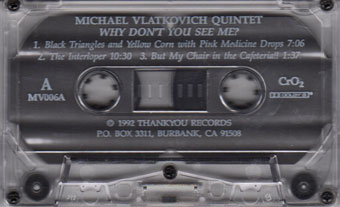
MV007 COPY
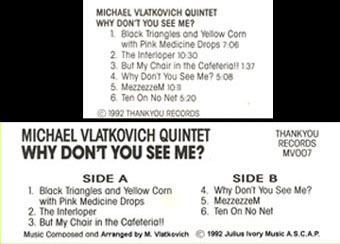
MV007 LAYOUT
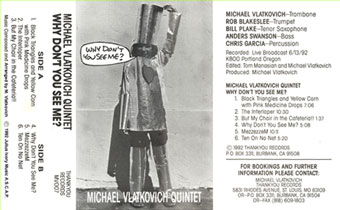
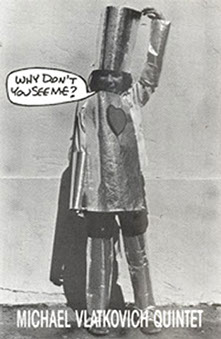
COLLECTIVE THOUGHT
PURCHASE
PHYSICAL CASSETTE
MV006 (Cassette (1991)
$20.00
INCLUDING SHIPPING
The people in the front are going to have a good time.
The people in the back are going to have a good time too.
PERSONNEL
Michael Vlatkovich – trombone / compositions
Jay Hutson - tenor Saxophone
Rory Stuart - guitar
Ken Park - marimba
Warren Hartman - keyboard
David Crigger - percussion
REVIEWS
No know reviews.
ART
MV006 CASSETTE
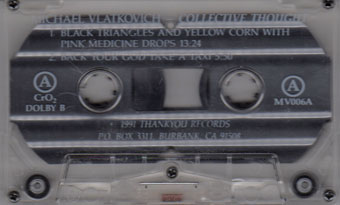
MV006 COPY
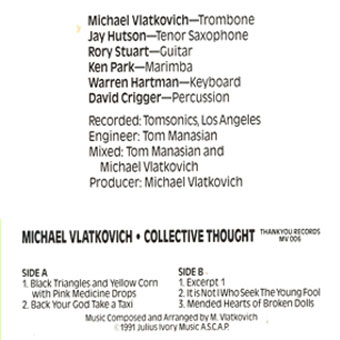
MV006 FRONT
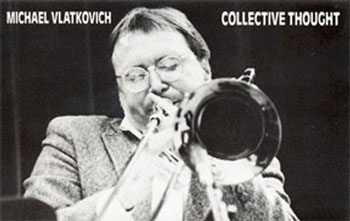
MV006 LAYOUT
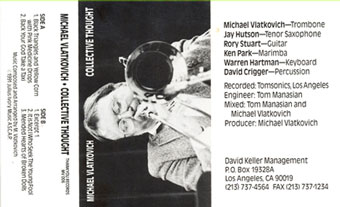

PAGE
02
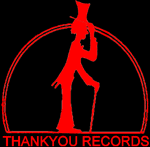
Copyright © 2018 Michael Vlatkovich
Design by Chuck Britt
